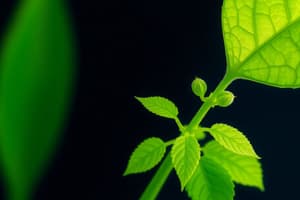Podcast
Questions and Answers
Which process involves only photosystem I (PSI) and recycles electrons?
Which process involves only photosystem I (PSI) and recycles electrons?
During photophosphorylation, what replaces the lost electrons in photosystem II?
During photophosphorylation, what replaces the lost electrons in photosystem II?
What does cyclic photophosphorylation primarily produce?
What does cyclic photophosphorylation primarily produce?
What enzymes are involved in the transfer of electrons to NADP+ during photophosphorylation?
What enzymes are involved in the transfer of electrons to NADP+ during photophosphorylation?
Signup and view all the answers
Which mechanism directly produces ATP during photophosphorylation?
Which mechanism directly produces ATP during photophosphorylation?
Signup and view all the answers
What is the primary product synthesized from glyceraldehyde 3-phosphate (GALP) in the Calvin cycle?
What is the primary product synthesized from glyceraldehyde 3-phosphate (GALP) in the Calvin cycle?
Signup and view all the answers
Which factor can cause a decrease in the rate of photosynthesis if it exceeds an optimum level?
Which factor can cause a decrease in the rate of photosynthesis if it exceeds an optimum level?
Signup and view all the answers
In the context of photosynthesis, what role does DCPIP play in the Hill Reaction experiment?
In the context of photosynthesis, what role does DCPIP play in the Hill Reaction experiment?
Signup and view all the answers
Which substance is produced when glycerate 3-phosphate (GP) is utilized during the Calvin cycle?
Which substance is produced when glycerate 3-phosphate (GP) is utilized during the Calvin cycle?
Signup and view all the answers
What is the expected effect of increased light intensity on the Calvin cycle?
What is the expected effect of increased light intensity on the Calvin cycle?
Signup and view all the answers
Where does the Calvin cycle take place within the chloroplast?
Where does the Calvin cycle take place within the chloroplast?
Signup and view all the answers
What is the primary product formed during the reduction phase of the Calvin cycle?
What is the primary product formed during the reduction phase of the Calvin cycle?
Signup and view all the answers
What role does RuBisCO play in the Calvin cycle?
What role does RuBisCO play in the Calvin cycle?
Signup and view all the answers
What happens to most of the glyceraldehyde 3-phosphate (GALP) molecules produced in the Calvin cycle?
What happens to most of the glyceraldehyde 3-phosphate (GALP) molecules produced in the Calvin cycle?
Signup and view all the answers
Which compounds provide energy and electrons during the reduction phase of the Calvin cycle?
Which compounds provide energy and electrons during the reduction phase of the Calvin cycle?
Signup and view all the answers
What is the main function of the light-dependent reaction in photosynthesis?
What is the main function of the light-dependent reaction in photosynthesis?
Signup and view all the answers
Which reaction occurs during photolysis in photosynthesis?
Which reaction occurs during photolysis in photosynthesis?
Signup and view all the answers
Where do the light-independent reactions occur in the chloroplast?
Where do the light-independent reactions occur in the chloroplast?
Signup and view all the answers
What is the role of ATP in the light-independent reactions?
What is the role of ATP in the light-independent reactions?
Signup and view all the answers
What is generated during cyclic photophosphorylation?
What is generated during cyclic photophosphorylation?
Signup and view all the answers
What process helps to create a proton gradient during the light-dependent reactions?
What process helps to create a proton gradient during the light-dependent reactions?
Signup and view all the answers
What primarily excites the electrons in the chlorophyll during the light-dependent reaction?
What primarily excites the electrons in the chlorophyll during the light-dependent reaction?
Signup and view all the answers
What is formed when NADP is reduced in photosynthesis?
What is formed when NADP is reduced in photosynthesis?
Signup and view all the answers
Which of the following statements is true about the products of the light-dependent reaction?
Which of the following statements is true about the products of the light-dependent reaction?
Signup and view all the answers
What occurs during chemiosmosis in the thylakoid membrane?
What occurs during chemiosmosis in the thylakoid membrane?
Signup and view all the answers
What is the purpose of grinding spinach leaves in the chloroplast extraction procedure?
What is the purpose of grinding spinach leaves in the chloroplast extraction procedure?
Signup and view all the answers
What happens to DCPIP during the Hill reaction?
What happens to DCPIP during the Hill reaction?
Signup and view all the answers
Why is it important to zero the colorimeter with distilled water before measuring chloroplast extract?
Why is it important to zero the colorimeter with distilled water before measuring chloroplast extract?
Signup and view all the answers
What is the effect of varying the distance of the tubes from the lamp in this experiment?
What is the effect of varying the distance of the tubes from the lamp in this experiment?
Signup and view all the answers
What is indicated by a decrease in absorbance during the Hill reaction?
What is indicated by a decrease in absorbance during the Hill reaction?
Signup and view all the answers
What do the negative control tubes in this experiment demonstrate?
What do the negative control tubes in this experiment demonstrate?
Signup and view all the answers
Which factor should remain constant when repeating the experiment to ensure reliable results?
Which factor should remain constant when repeating the experiment to ensure reliable results?
Signup and view all the answers
What is the purpose of resuspending the chloroplast pellet in chilled isolation solution?
What is the purpose of resuspending the chloroplast pellet in chilled isolation solution?
Signup and view all the answers
Study Notes
Photosynthesis: Light-Dependent Reactions
- Photosynthesis is split into two stages: light-dependent and light-independent (Calvin cycle)
- Light-dependent reactions need light energy
- Light energy is absorbed by photosynthetic pigments in thylakoid membranes
- Light energy is converted to chemical energy in the form of ATP and NADPH
- Water is split, releasing H+ and electrons, producing oxygen as a waste product
- ATP and NADPH are used in light-independent reactions
- Light energy excites electrons in chlorophyll, which are transferred along an electron transport chain
- Photolysis of water produces H+ (hydrogen ions), electrons, and O2
- This process creates a proton gradient across the thylakoid membrane
- The ATP synthase enzyme uses the proton gradient to make ATP from ADP and inorganic phosphate
- Excited electrons lose energy as they move along the electron transport chain, this energy is used to make ATP
- Electrons are transferred to NADP+, producing reduced NADP
- Reduced NADP is used in light-independent reactions
Photosynthesis: Light-Independent Reactions
- Also called the Calvin cycle
- Takes place in the stroma of chloroplasts
- Doesn't directly use light energy
- Uses the ATP and NADPH produced in light-dependent reactions
- CO2 enters the leaf through the stomata and diffuses into the stroma of the chloroplast
- CO2 is combined with ribulose bisphosphate (RuBP) by the enzyme RuBisCO
- This forms an unstable 6-carbon compound, which quickly breaks down into two molecules of glycerate 3-phosphate (GP)
- ATP and reduced NADP are required for the reduction of GP to glyceraldehyde 3-phosphate (GALP)
- Two molecules of GALP can be used to make a hexose sugar (e.g., glucose)
- RuBP is regenerated using the rest of the ATP produced by the light-dependent reaction
Factors Affecting Photosynthesis
- Light Intensity: Increases rate at first, then levels off
- CO2 Availability: Increases rate at first, then levels off
- Temperature: Increases rate to optimum, then decreases as enzymes denature
Studying That Suits You
Use AI to generate personalized quizzes and flashcards to suit your learning preferences.
Description
Test your knowledge on the various processes involved in photosynthesis, including the roles of photosystems, photophosphorylation, and the Calvin cycle. This quiz covers key questions about electron transfer, ATP production, and the effects of environmental factors on photosynthesis. Perfect for those studying plant biology or biochemistry!




